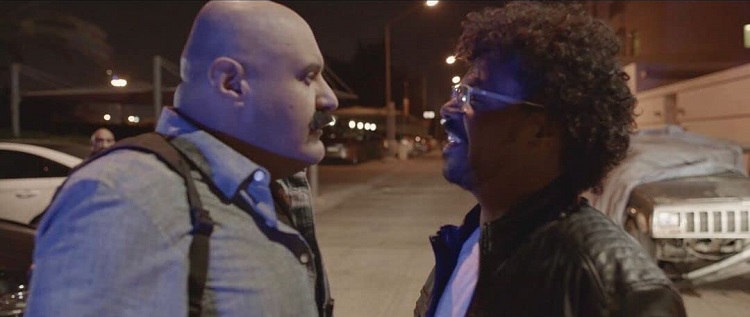Subtext | The Dead Rise
There are a lot of shows and movies from around the world that deal with different types of the living dead: zombies, vampires, and even stranger things. Writers like David McNally have drawn links between these monsters and people’s views of society at the time. Romero’s Dawn of the Dead, for example, has zombies shuffling around a shopping mall in a reflection of worries about consumerist culture at the time. Given that, perhaps we can gain an insight into foreign cultures by looking at how they treat their monsters? Perhaps, but probably not today. Instead we’ll start by looking at a couple of stranger examples, one from somewhere you’d expect and one…probably not.

Zombie Detective (2021)
Zombies aren’t a traditional part of Korean folklore, but then again the movie zombie isn’t really a part of any folklore. Zombie movies were originally based on Caribbean mythology, where a “zombie” was a corpse revived to be the servant of a sorcerer. The film that redefined zombies never even mentions the word. George Romero’s Night of the Living Dead was actually based on post-apocalyptic stories like I Am Legend, telling the story of corpses inexplicably rising from the grave to feast on the living. These were soon labelled zombies as well, and within months the first low-budget European zombie film to cash in on the craze was released. The fact that Night of the Living Dead’s theatrical distributor messed up the copyright and so the film was in the public domain helped to fuel this first wave of zombie movies. Video games like Resident Evil led to a new wave of zombie media in the 2000s, but nowadays they are mostly on the wane. The main exception is in Korea, where Train to Busan in 2016 and Kingdom in 2019 have kept them relevant. That’s what gave Zombie Detective an audience.
The first episode begins with a zombie (veteran leading man Choi Jin-hyuk) gradually awakening to sentience in the woods. As his mind comes into focus he witnesses the murder of a private detective before finding an abandoned gym with a working treadmill and television, where he teaches himself to be human. The zombie assumes the dead detective’s identity as Kim Moo-young, in order to attempt to integrate into human society. A series of misadventures see him allied with Gong Sun-ji (Park Ju-hyun, who is a relative newcomer to acting), an investigative reporter haunted by one case she failed to solve. Together they set out to solve crimes. A rival detective agency across the street help to add to the comedy, as does Sun-ji’s brother in law Lee Tae-kyun (Ahn Se-Ha). He’s a director of low-budget zombie movies, including one (very clearly a Train to Busan homage) that helped the zombie detective understand what he was.
Combining comedy with suspense and mystery is a delicate business, but Zombie Detective manages to walk the line with aplomb. The comedy never deflates the terror, and the scares never make the comedy fall flat. In addition it manages to bring something fairly new to the zombie genre. A running element throughout the series is Kim Moo-young trying to convince Lee Tae-kyun that zombies deserve sympathy, and that every zombie tale is a tragedy for those deceased. I don’t think I’ll be able to look at the Living Dead in quite the same way again.

The End (2019)
First things first. The End is not a good movie. In part that’s because it can’t seem to decide what sort of movie it is. Is it a broad comedy of errors? Is it about an English vampire awakening in Kuwait City after a century of forced slumber? Is it a gritty crime drama about betrayal? It seems to try to be all of these things and none of them, copying the form of other films without the function. Which is oddly appropriate, given some of the director’s other work.
Kuwait doesn’t have a huge film industry. Fifty years ago the first cinematic film was made in Kuwait: Cruel Sea, about a young man who goes to sea to earn enough money to marry his beloved. (Unfortunately for them both this film was part of the “Arab realism” movement, so it doesn’t end well.) Eight years before that had been their first TV film, The Storm, about the history of Kuwait. Over the following decades it was TV features that were more common, as Kuwait lacked the infrastructure (and government support) that a true film industry needed. There have been a few gems, (Tora Bora, which was shown at Cannes in 2011, for example), but those have been few and far between. Looking at the CV of Muhammad Al-Hmeli (director and writer of The End), for example, is instructive. He has eighty-one directing credits, going back to 2005, but The End was his first film. Aside from a radio series and two TV shows, before that all of his credits are plays. Because Kuwaiti cinema might not be so hot – but Kuwaiti theatre is thriving.
As a quick aside, I have to say that some of the plays that Al-Hmeli has directed are fascinating. Like a lot of the world, Kuwait is quite happy to take a Western media property, file the serial numbers off, and adapt it for the local market. That’s why you get Dinosaur Island (with the Jurassic Park logo on the poster), The Return Of The Bat (wearing a Batman outfit), Story Of A Smurf, and my personal favourite: Spider Man. Why is it my favourite? Well, check out the poster below (which shows the main villain) and you’ll see why.

As I said, The End is not a good movie. But it is a lot of fun. There’s an anarchic B-movie authenticity to it that you don’t get so much these days. The plot may make no sense, but for an interesting reason. It’s not that there’s no plot – it’s that there’s too much plot. It feels like Al-Hmeli had at least three different stories he wanted to tell, so he decided to tell them all at once. The result is chaotic, with a twist ending that only left me even more confused, but one thing it never did was bore me. And that can’t be all that bad.
That’s the end of our look at the international undead – at least for now. As I said, there are a lot of these out there, and we’ll be looking at them again soon. After all, that’s the thing with the undead: you never really do get rid of them.
All images via IMDB except “Spider Man” poster via El Cinema.

